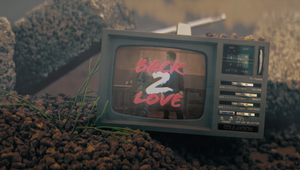
Handle with Care: Shining the Spotlight on America’s Unsung Heroes

American Anthems, the new six-part series from PBS, follows much-loved country musicians as they pay tribute to inspiring individuals facing extraordinary circumstances. In a touching collaboration, each episode sees these artists present local heroes with heartfelt and personal songs, written especially for them. Cave 76’s head of post production, Lizzie Minges, edited two episodes in the series: ‘Let the Words Come Out’, starring singer Lindsay Ell, and ‘Make Tomorrow Come Today,’ featuring Grammy-nominated Cam. With hours of footage to work with, Lizzie took an empathetic approach to the edit, determined to do full justice to the powerful and deeply personal narratives while still adhering to the technical requirements of the series. Lizzie embraced the challenge of working on a multi-part documentary series and dove right into American Anthems, relishing the creative opportunity to carve an episodic landscape that captured the emotive essence of each story. Today Lizzie sits down with LBB to discuss her experience editing the episodes of this moving musical series. Lizzie> I was given a broad production outline of each episode based on the content of the interviews - kind of an “in a perfect world, we then go to this.” It served as a really helpful guiding principle while getting to know the project and helped me start off on the right foot with the key creatives by hitting those notes. The previous episodes also helped guide me on structure and style - from there it was a joy to create my own interpretation of each story within those bounds. Putting together these stories in a way that satisfied the initial vision of the director and the practical needs of the network was a delightful puzzle to solve, and it’s really one of my favourite things about editing: helping to ensure everyone’s creative voice is heard while, respectfully, maintaining your own. It definitely helps to be a bit of an empath in this career field - and especially so with such heavy material! Lizzie> So much! This was my first time working on a multi-part documentary series, and it was new to me to have so many storytelling options, via multiple takes. I’m more familiar with the classic documentary format wherein the moment of action or interview happens completely organically, and as the editor you just have to make it work with what you’ve got. While I love options, it was tricky trying to strike the balance between hitting every note in the production outline and doing that intense storytelling full emotional justice. Lizzie> Much like a character really feeling their words on a first take, as an editor I really wanted to keep those themes close to my heart and not let any of the content become too rote to me, despite working through these scenes so many times. I felt it was important that those stories continue to be handled thoughtfully, so I took many breaks from the material - both to recover from the content and to approach each edit session as if experiencing it for the first time. I remember tearing up when I first watched Lindsay’s performance for Greta, and I made it a goal of mine to put myself in Greta’s shoes every time I cut that scene, just to ensure the gravity of that final moment was never lost. Lizzie> I really hope that episode did exactly what Lindsay did for Greta: made any survivors of sexual assault watching at home feel empowered by, and less alone in, their own survival. That sentiment of “Let the words come out” is definitely an anthem that could speak to many, and I think there’s some comfort to be found in knowing there are so many other voices in that chorus. In the edit, I wanted to feature as many participants of Greta McClain’s Silent No Longer organization as possible, to really demonstrate how sexual assault can affect all walks of life and how different types of people can come together and heal in such empowering and unconventional ways. Lizzie> ‘Make Tomorrow Come Today’ was much more cinema verite than the previous episode, which gave me a little longer of a leash as far as constructing that initial edit. There were so many wonderful moments with all the children choosing their books, enjoying the books, showing off the books - and the gratefulness of the teachers and faculty was so special. It was fun to let that joy be the guide while the abstract idea of what the scenes should accomplish served as guide rails in getting there. Lizzie> I actually caught covid about two weeks before picture lock on ‘Make Tomorrow Come Today’ - and I’m happy to say that passing the reins to my Mexico City-based Cave 76 colleague Jeronimo Villar during that crucial time went really well! I feel like that’s really drilled into you when you first start editing: should you evaporate from the earth tomorrow, make sure those project files are organised to a tee so that someone else can hop on. This was the first time in my career when that was really put to the test, and it was a relief to peek through the haze of illness and see how quickly Jero was able to orient himself into a project of that density from so far away. Another major snag I felt I was hitting with this project was dealing with the exacting time requirements of broadcast television - cutting with your heart while keeping the runtime unchanged, down to the frame, is incredibly challenging. There were so many transitions and thoughtful pauses that needed to be cut for time. It was a great exercise in killing your darlings for the sake of the bigger picture. Giving myself some breathing room between edit sessions helped me a lot with this - if I remained glued to a scene for too long, I found myself missing the pieces that really needed to go. LBB> What was the editing brief on both episodes like?
LBB> How much material did you have to work with?
LBB> The episode ‘Let the Words Come Out’ follows Lindsay Ell and Kristian Bush as they craft a fight song for a woman helping sexual assault survivors. How did you approach an edit for an episode dealing with such sensitive themes?
LBB> What did you want the viewer to take away from the episode, and how did you guide them through your edit?
LBB> The episode ‘Make Tomorrow Come Today’ is about Grammy nominee Cam surprising Black Book Project founder Meredith McKinney with an anthem urging us to act now. How did the edit on this episode differ from the previous one?
LBB> Did you run into any challenges while working on the two episodes? If so, how did you overcome them?
LBB> Finally, what was your favourite part of working on the episodes?
Lizzie> My favourite part of any edit is the music - and I felt very fortunate to work on a show that centres around that very topic! But outside of the actual performance scenes, digging through the NBC music database to find the right underscore to make a scene really 'click' was most enjoyable to me. Especially so when dealing with heavy themes - you really have to get it right. Because this was a show centred around music, I really took my time and enjoyed creating some of the musical soundscapes in these edits: from slowing down tunes to give them more of a lonely drone to using captured set audio to underscore establishing shots. Seeing some of those understated creative choices really work for the piece, and eventually seeing them broadcast to such a wide audience, was extremely gratifying.









